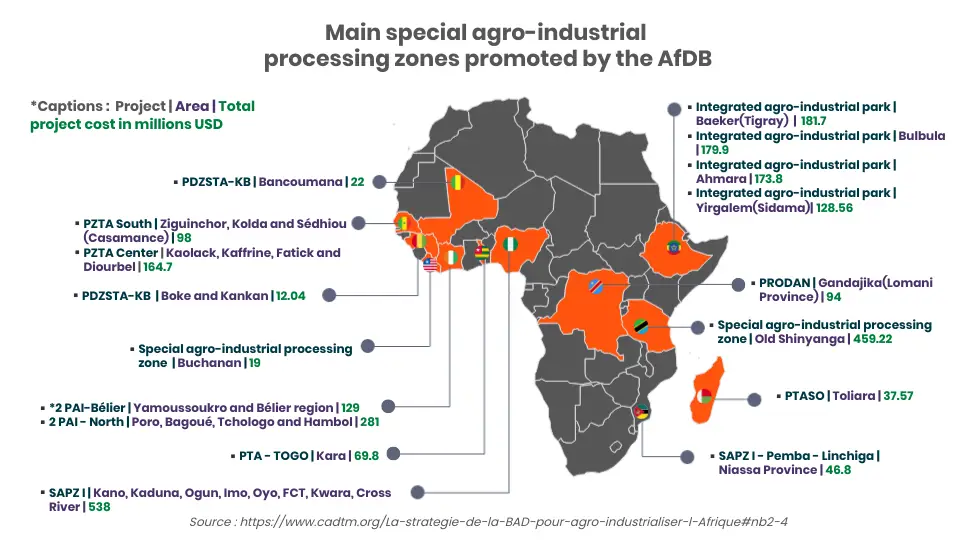Since 1997, the African Development Bank (AfDB) has recognized agriculture as a strategic priority to become a major growth driver in Africa. To fully harness this potential, private funds must support large-scale projects.
AfDB’s involvement in agriculture
The AfDB has financed over 1,161 agricultural projects totaling 18.4 billion USD. The « Feed Africa » program, launched in 2016, is at the core of this strategy, with an investment of 24 billion USD planned by 2025. The goal is clear: to transform African agriculture into a competitive commercial sector capable of meeting the continent’s food needs and capturing global market shares.
The AfDB segments the continent into priority zones for specific crops :
- Wheat in North Africa
- Rice in West Africa
- Maize and soybeans in the Guinea Savanna
- Horticulture across the continent
This approach aims to maximize yields by focusing on specific value chains and developing suitable infrastructure.
Dakar 2 agricultural pact
At the Dakar summit, the AfDB launched agricultural pacts supported by the African Union. These framework agreements aim to improve yields of strategic crops, expand agricultural lands, and mechanize farming. However, criticisms have emerged regarding the imprecise drafting of some documents, lack of clarity on total project costs, and disregard for biodiversity.
One of the private investment funds supported by the AfDB, Verod Capital, highlights the difficulty of structuring effective projects with smallholders. Large agricultural enterprises, which are more competitive, have the resources needed to modernize agriculture and attract more private funding.
Establishment of SAPZ
The AfDB is also introducing Special Agro-Industrial Processing Zones (SAPZ) to develop the infrastructure and logistics needed for « competitive food and agricultural value chains ». This initiative, inspired by the concept of « agropoles », aligns with the African Union’s African Continental Free Trade Area (AfCFTA) strategy.
In the need for legal adjustments, the Bank provides loans as leverage for these adaptations. For instance, in Madagascar in 2019, the disbursement of the AfDB’s Economic Competitiveness Enhancement Program was conditioned on the adoption of a decree on agropoles, criticized by the TANY Collective.
TAAT: Reducing food imports
Launched in 2017, the « Technologies for African Agricultural Transformation » (TAAT) initiative benefits from over 800 million USD. This program aims to modernize African agriculture and reduce food imports by collaborating with multinational seed companies and introducing innovative agricultural technologies. In 2014, the AfDB provided a 300 million USD loan to Aliko Dangote to build a fertilizer plant. Concurrently, the « African Fertilizer Financing Mechanism » (AFFM) facilitates smallholders’ access to agricultural inputs, with millions of tons of fertilizers distributed across the continent.
Major concerns regarding AfDB projects
AfDB investments lead to several social and environmental conflicts affecting local communities. The institution is involved in over 14 conflicts in Africa, according to the Environmental Justice Atlas. Social movements and women’sorganizations have launched campaigns to highlight the impacts of these projects on populations.
Land issues and expropriations
Agricultural pacts often include public-private partnerships, a controversial model for its tendency to favor large multinationals. For example, in Gabon, a partnership between the government and the multinational Olam has faced criticism for land grabbing through palm oil plantations. This model is repeated in other countries, risking compromising local food sovereignty.
SAPZs are generally located on community lands expropriated by the state and handed over to investors. These Zones involve large-scale territorial reorganization. This type of plantation leads to increased land prices, speculation, evictions, and risks of indebtedness and land loss.
Social and environmental issues
The expansion of SAPZs directly threatens smallholder agriculture, which accounts for 80 % of the food consumed in Africa. Small pastoral farmers use adapted technologies and short supply chains to meet local needs while preserving ecosystems. However, instead of being supported, this model is marginalized by AfDB policies that favor agribusiness.
Moreover, partnerships with companies like Syngenta and Bayer face criticism. Local associations denounce the negativeeffects of these collaborations on food sovereignty. The use of chemical fertilizers and pesticides, supported by the AfDB, contributes to soil degradation and environmental pollution. The collaboration enriches a handful of multinationals but is less beneficial for farmers.
Impact on public debt
The impact of these investments on African countries’ debt remains a major concern. The interest can exacerbate public debt, which is already unsustainable for many developing economies. In 2022 alone, African debt interest reached 44 billion USD, while the costs and profits resulting from the financing are mostly ambiguous.
The agro-industrialization promoted by the AfDB, although promising for productivity, could increase dependence on multinationals. In the long run, food sovereignty might be compromised. The sustainability and inclusiveness of these agricultural initiatives remain to be proven. The coming years will determine if this strategy can truly transform African agriculture.







